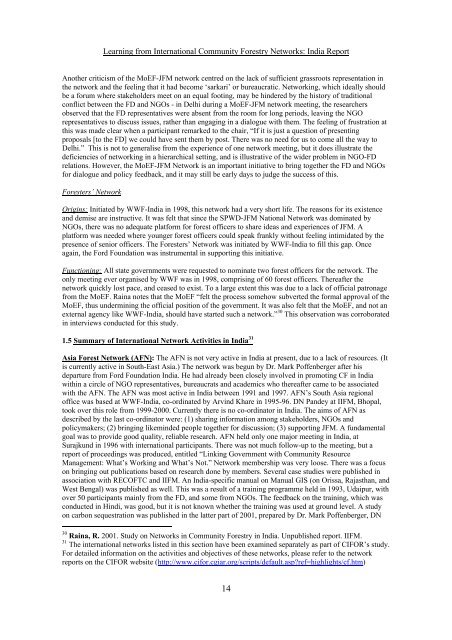Snapshots of International Community Forestry Networks: Country ...
Snapshots of International Community Forestry Networks: Country ...
Snapshots of International Community Forestry Networks: Country ...
Create successful ePaper yourself
Turn your PDF publications into a flip-book with our unique Google optimized e-Paper software.
Learning from <strong>International</strong> <strong>Community</strong> <strong>Forestry</strong> <strong>Networks</strong>: India Report<br />
Another criticism <strong>of</strong> the MoEF-JFM network centred on the lack <strong>of</strong> sufficient grassroots representation in<br />
the network and the feeling that it had become ‘sarkari’ or bureaucratic. Networking, which ideally should<br />
be a forum where stakeholders meet on an equal footing, may be hindered by the history <strong>of</strong> traditional<br />
conflict between the FD and NGOs - in Delhi during a MoEF-JFM network meeting, the researchers<br />
observed that the FD representatives were absent from the room for long periods, leaving the NGO<br />
representatives to discuss issues, rather than engaging in a dialogue with them. The feeling <strong>of</strong> frustration at<br />
this was made clear when a participant remarked to the chair, “If it is just a question <strong>of</strong> presenting<br />
proposals [to the FD] we could have sent them by post. There was no need for us to come all the way to<br />
Delhi.” This is not to generalise from the experience <strong>of</strong> one network meeting, but it does illustrate the<br />
deficiencies <strong>of</strong> networking in a hierarchical setting, and is illustrative <strong>of</strong> the wider problem in NGO-FD<br />
relations. However, the MoEF-JFM Network is an important initiative to bring together the FD and NGOs<br />
for dialogue and policy feedback, and it may still be early days to judge the success <strong>of</strong> this.<br />
Foresters’ Network<br />
Origins: Initiated by WWF-India in 1998, this network had a very short life. The reasons for its existence<br />
and demise are instructive. It was felt that since the SPWD-JFM National Network was dominated by<br />
NGOs, there was no adequate platform for forest <strong>of</strong>ficers to share ideas and experiences <strong>of</strong> JFM. A<br />
platform was needed where younger forest <strong>of</strong>ficers could speak frankly without feeling intimidated by the<br />
presence <strong>of</strong> senior <strong>of</strong>ficers. The Foresters’ Network was initiated by WWF-India to fill this gap. Once<br />
again, the Ford Foundation was instrumental in supporting this initiative.<br />
Functioning: All state governments were requested to nominate two forest <strong>of</strong>ficers for the network. The<br />
only meeting ever organised by WWF was in 1998, comprising <strong>of</strong> 60 forest <strong>of</strong>ficers. Thereafter the<br />
network quickly lost pace, and ceased to exist. To a large extent this was due to a lack <strong>of</strong> <strong>of</strong>ficial patronage<br />
from the MoEF. Raina notes that the MoEF “felt the process somehow subverted the formal approval <strong>of</strong> the<br />
MoEF, thus undermining the <strong>of</strong>ficial position <strong>of</strong> the government. It was also felt that the MoEF, and not an<br />
external agency like WWF-India, should have started such a network.” 30 This observation was corroborated<br />
in interviews conducted for this study.<br />
1.5 Summary <strong>of</strong> <strong>International</strong> Network Activities in India 31<br />
Asia Forest Network (AFN): The AFN is not very active in India at present, due to a lack <strong>of</strong> resources. (It<br />
is currently active in South-East Asia.) The network was begun by Dr. Mark P<strong>of</strong>fenberger after his<br />
departure from Ford Foundation India. He had already been closely involved in promoting CF in India<br />
within a circle <strong>of</strong> NGO representatives, bureaucrats and academics who thereafter came to be associated<br />
with the AFN. The AFN was most active in India between 1991 and 1997. AFN’s South Asia regional<br />
<strong>of</strong>fice was based at WWF-India, co-ordinated by Arvind Khare in 1995-96. DN Pandey at IIFM, Bhopal,<br />
took over this role from 1999-2000. Currently there is no co-ordinator in India. The aims <strong>of</strong> AFN as<br />
described by the last co-ordinator were: (1) sharing information among stakeholders, NGOs and<br />
policymakers; (2) bringing likeminded people together for discussion; (3) supporting JFM. A fundamental<br />
goal was to provide good quality, reliable research. AFN held only one major meeting in India, at<br />
Surajkund in 1996 with international participants. There was not much follow-up to the meeting, but a<br />
report <strong>of</strong> proceedings was produced, entitled “Linking Government with <strong>Community</strong> Resource<br />
Management: What’s Working and What’s Not.” Network membership was very loose. There was a focus<br />
on bringing out publications based on research done by members. Several case studies were published in<br />
association with RECOFTC and IIFM. An India-specific manual on Manual GIS (on Orissa, Rajasthan, and<br />
West Bengal) was published as well. This was a result <strong>of</strong> a training programme held in 1993, Udaipur, with<br />
over 50 participants mainly from the FD, and some from NGOs. The feedback on the training, which was<br />
conducted in Hindi, was good, but it is not known whether the training was used at ground level. A study<br />
on carbon sequestration was published in the latter part <strong>of</strong> 2001, prepared by Dr. Mark P<strong>of</strong>fenberger, DN<br />
30 Raina, R. 2001. Study on <strong>Networks</strong> in <strong>Community</strong> <strong>Forestry</strong> in India. Unpublished report. IIFM.<br />
31 The international networks listed in this section have been examined separately as part <strong>of</strong> CIFOR’s study.<br />
For detailed information on the activities and objectives <strong>of</strong> these networks, please refer to the network<br />
reports on the CIFOR website (http://www.cifor.cgiar.org/scripts/default.asp?ref=highlights/cf.htm)<br />
14

















![CynefinFramework final [Read-Only]](https://img.yumpu.com/19017304/1/190x135/cynefinframework-final-read-only.jpg?quality=85)